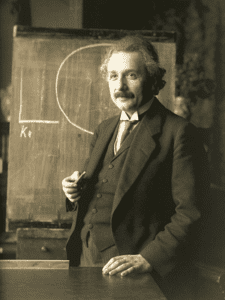Jane Rex is a PhD research student in the Theoretical Nuclear Physics Group at the University of Surrey. Her PhD project is about developing quantum computing algorithms to solve problems in many-body nuclear physics. Jane had originally intended to study medicine before realising her true love for quantum physics.

“In modern media, there is a stereotype of the ‘lone male genius’ whereby science appears to be propelled by the genius of a few exceptional individuals, e.g. Einstein and Newton. This stereotype is simply not the case and in fact, it is hugely harmful.”
From biomedical sciences to theoretical physics
After moving from India to UK with my parents when I was a toddler, I set my sights on studying medicine, just like my dad… I barely got one year into my biomedical sciences degree before I knew it was certainly not for me.
At the time, I was thoroughly absorbed in the popular science books by Stephen Hawking and Professor Jim Al-Khalili so I taught myself A-level maths in order to transfer onto the BSc Physics course at the University of Sheffield. I found myself more drawn to the mathsy side of things though, and consequently did my MSc in Mathematical Physics at the University of Nottingham (entirely online from my one-bedroom flat during the lockdown! Not quite the way I saw that going…).
Fast forward to now, I am a first-year theoretical physics PhD student at the University of Surrey, specialising in quantum computing supervised by Dr Paul Stevenson and Professor Jim Al-Khalili.
Keeping up to date with quantum computing and nuclear physics
My day-to-day work includes keeping up to date on the current literature on quantum computing and the nuclear physics world, attending research group meetings, doing maths/ programming (and getting lots of cups of tea!).

Quantum technologies solving ‘impossible’ problems
Quantum technologies already play a crucial role in our lives. MRI scanners, lasers, atomic clocks and electron microscopes all use the principles of quantum mechanics in their operation. Similarly, a quantum computer is a special type of computer that can be exponentially more powerful than traditional (classical) computers by exploiting the principles of quantum mechanics.
This means that in the future, they can be used to solve problems that would be practically impossible using even the fastest traditional supercomputers. They’ll be able to model complex processes from sub-atomic particle collisions to the interactions of drugs in the human body and be able to crack seemingly ‘unbreakable’ codes.
A quantum computer is fundamentally different to a classical computer because it uses systems of qubits to encode information rather than bits. A classical bit can either be in state 0 or 1, whereas a qubit can be in a superposition of both states by the mind-boggling principle of quantum entanglement. Quantum computing has developed rapidly since its conception in the 1980s, but we are still far from achieving total quantum supremacy where the quantum computer always outperforms classical computers.
Today, we are in the ‘NISQ’ (Noisy Intermediate Scale Quantum) era — the capabilities of the latest quantum computers are limited by environmental noise destroying the delicate quantum systems that make up the qubits. The name of the game for quantum computing scientists today is to create clever algorithms that can correct for these noisy effects and utilise the special power of NISQ-era quantum computers to solve problems that would be very time-consuming on traditional computers.
Using quantum computing to develop solutions to big problems with small atoms
The nucleus of an atom contains tiny quantum particles called protons and neutrons which all interact and exert a force on each other. The more of these that are inside the nucleus, the more complicated (and computationally intense) it becomes to try and understand the behaviour of the nucleus as a whole.
We want to predict how the shape of the nucleus changes as it vibrates and what energies it can have i.e., its ‘vibrational deformation states’. Predicting this behaviour is the realm of ‘many-body quantum mechanics’ and the problem can be approached in several different ways.
My PhD is on trying to understand how quantum computers can be used to solve these types of physics problems, and to develop quantum computing algorithms to approximate solutions to these many-body nuclear systems.
Exploding the hugely harmful lone male genius stereotype

In modern media, there is a stereotype of the ‘lone male genius’, whereby science appears to be propelled by the genius of a few exceptional individuals, e.g. Einstein and Newton. This stereotype is simply not the case and in fact, it is hugely harmful.
It disregards the contributions of countless people (often people in minority groups) and gives a grossly inaccurate portrayal of how science works; this actively dissuades talented individuals from pursuing careers in physics.
Progress in physics has always been hugely collaborative, and relies on large teams of scientists building on the work of other groups. A diverse team of people (diverse in this case means in terms of ethnicity, religion, socioeconomic background, gender, disability status, sexual orientation etc.) will have better problem-solving approaches than a less-diverse team of people.
Modern physics wasn’t built off the back of a handful of lone male geniuses. It was built from huge global teams of scientists, correcting each other, supporting each other and building on the work of their predecessors. Progress is gradual, it isn’t in huge chunks and you don’t have to be a child prodigy to make a contribution to the field.
The physics community suffers from a lack of diversity; to propel physics further, we must improve the diversity of its workforce and make it a more inclusive and welcoming environment.
Start with what inspires you

Popular physics books or magazine articles are quite readable and are a much better starting place than reading textbooks. YouTube is also a fantastic resource with many talented people creating beautifully succinct explanations and animations of mind-boggling physics. This is how I started (I was obsessed with learning about black holes when I first got into physics)!
One key piece of advice is to find a community of like-minded people and support each other, whether that is at your school, university or local area. For example, I joined the Institute of Physics Women in Physics Group which runs events and workshops throughout the year and offer prizes to showcase the contributions of women in the field.
I attended many conferences/talks specifically for women and non-binary people and always found these hugely useful. Connecting with inspirational women and creating a community of other early-career physicists in minority groups massively helped with feelings of being an imposter, especially since I was the only female in my MSc course at Nottingham.
Sharing fascinating life stories and challenging stereotypes in science

I am excited to get more involved in science communication at the university during my PhD, helping to break down stereotypes in science, and inspiring young people to study physics.
Albert Einstein image credit: By Ferdinand Schmutzer





